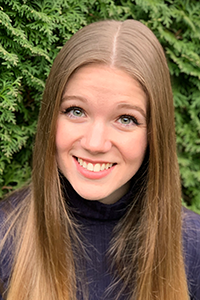 Lauren Copping (she/her) is a recent graduate from the Master of Physical Therapy program at the University of British Columbia. She completed her Bachelors in Dance Science at Texas A&M University, where she performed in a contemporary dance company that travelled throughout the United States. Lauren then finished her Masters in Dance Science at Trinity Laban Conservatoire of Music and Dance in London, England.
Lauren Copping (she/her) is a recent graduate from the Master of Physical Therapy program at the University of British Columbia. She completed her Bachelors in Dance Science at Texas A&M University, where she performed in a contemporary dance company that travelled throughout the United States. Lauren then finished her Masters in Dance Science at Trinity Laban Conservatoire of Music and Dance in London, England.
Lauren is passionate about merging her interests in dance and physical therapy, which she has pursued through her involvement with the International Association of Dance Medicine and Science. She has been a member of the IADMS Student Committee since 2018 and took over as Co-Chair in October 2021. As she begins her physical therapy career, she is excited to further her interest in dance injuries. In her spare time, Lauren loves dancing, skiing, going to yoga classes, and running in the forest with her Siberian husky.
What drew you to the Master of Physical Therapy (PT) degree at UBC?
I have been talking about pursuing my physical therapy degree since I was fourteen. My interest in physical therapy began due to my own experiences of seeking treatment after sustaining multiple injuries throughout my dance career. Personally, going through rehabilitation for numerous injuries has motivated me to want to help others recover from their own injuries so they can return to participating in the activities they are passionate about. I specifically chose to study at UBC because I wanted to stay in Vancouver. Prior to starting the MPT program, I was away for 8 years studying in the United States and United Kingdom. Studying internationally was an incredible experience, but being away made me appreciate living in Vancouver. I also want to start my career as a physical therapist in Vancouver, so I thought attending UBC would be a great way to make connections with practicing clinicians.
How has studying in the MPT program made an impact on you?
This program has highlighted the scope of what physiotherapy has to offer. Realizing there are so many different avenues to make a difference in this career is really exciting. I’m currently interested in pursuing orthopedics, but I love that I also have the ability to change pathways if I want to explore another area of this field. I truly got to experience the breadth of physical therapy when I completed one of my clinical placements in Northern BC at the Kitimat Hospital and Health Centre. During the six weeks, I felt as though I experienced every aspect of what physical therapy can offer. Not only did we work in the hospital doing acute care, long term care, and outpatient rehabilitation, but we also travelled throughout the community doing home visits. Working in Kitimat gave me an appreciation for rural healthcare and was overall an exceedingly rewarding opportunity.
What is your favorite memory from your time at UBC?
My favourite memory from my time at UBC is probably when we first returned to in-person classes in August 2020 after being online for almost five months. This was the first time the entire MPT cohort was back in person again following the start of the pandemic. When we first moved to online learning, there was so much uncertainty about if and when we might return to campus. As a healthcare program, we were fortunate to be approved to come back to in-person learning earlier than most programs. I am so fortunate for the exceptional education I have received during my time at UBC, but I must be honest in admitting that my classmates have been the highlight of this experience. The MPT program is challenging, so having such a wonderfully supportive and motivating group of individuals to share it with has been really special.
Where do you find inspiration?
As a physical therapist, I find inspiration in watching my clients improve. Throughout my clinical placements during the MPT program, my favourite experiences have been seeing patients achieve their goals. Rehabilitation can be a long and difficult journey, so it’s important to keep sight of what clients are working towards. Sharing in a clients’ joy and sense of accomplishment when they master a new skill is motivating. It serves as a daily reminder for why I went into this profession. I want to help people achieve their goals, so celebrating with clients in their successes is extremely rewarding. As I start my career, I am excited to continue finding inspiration from my clients.
What are your plans for after graduation?
I will begin working full-time at Myodetox Kitsilano in January 2022. I completed my final clinical placement there and was immediately drawn to the clinic and the people working there. I always want to keep learning and improving my knowledge base, so I’m thrilled to be joining a team that promotes continued education. Prior to starting work, I am taking about two months off, which I’m also quite excited about! I’ve been a student for a long time, so I’m looking forward to having a bit of time off before starting my physical therapy career in the new year.
How has your identity affected your perspective on the field of PT and your future pursuits?
The reason I learned about physical therapy was through my personal experience as getting injured as a dancer, which has motivated me to want to work with dancers. Many dancers feel like there are not enough healthcare practitioners who understand the demands of dance, so I hope to fill that void. Throughout the MPT program, I was open to considering other paths within physical therapy, but even before starting our first day of classes I knew I wanted to work with dancers and performing artists in some capacity. The reason I completed my MFA in Dance Science prior to pursuing my MPT was because I wanted to learn more specifically about the biomechanics, physiology, and psychology of dancers. I did not think my anecdotal experience as a dancer would be enough to help me specialize with this population. As I start working, I am excited to work with all individuals, but I do hope to eventually have a portion of my caseload composed of dancers and performing artists.
What is one thing you hope to accomplish?
I am very passionate about one day pursuing teaching. One short term goal of mine would be taking on physical therapy students as a clinical preceptor. Some of my preceptors have been incredible and truly made the entire learning experience invaluable. As a student, you really can tell when your preceptor is putting in the extra effort to ensure you have an impactful placement. Becoming a preceptor is definitely not something I want to accomplish right away, but maybe in 3 years or so it’s an idea I will revisit.
What does a healthy society mean to you?
To me, a health society means people are taking preventative steps to optimize their overall physical, mental, and emotional wellbeing. So much of healthcare is reactive, in that we are addressing issues once they arise. I would love if medicine could move towards being more prophylactic. In physical therapy specifically, we are often the resource people look to once they sustained an injury or ended up in hospital. I think physical therapists could also have a significant role in prioritizing keeping people healthy before they ever get injured. This is an area I hope to dive deeper into as I start working so I can consider how to prevent my clients from getting reinjured.
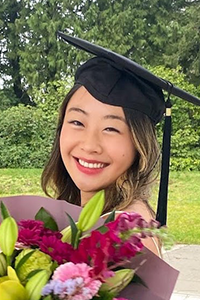 Iris Xie (she/her) is a recent graduate out of the Master of Occupational Therapy program at UBC. She is currently working at a specialized pain and trauma clinic where she helps clients manage chronic pain and get them back to doing the things they need to and want to do. Outside of work, Iris loves to dance, golf, run, and spend time outdoors. She also loves to eat and runs a food blog @yvrfooddiary where she shares all her food experiences around Vancouver. Iris’ goals after graduation are to continue seeking out learning experiences, build connections with people around her and trying her best to make a difference in her client’s lives.
Iris Xie (she/her) is a recent graduate out of the Master of Occupational Therapy program at UBC. She is currently working at a specialized pain and trauma clinic where she helps clients manage chronic pain and get them back to doing the things they need to and want to do. Outside of work, Iris loves to dance, golf, run, and spend time outdoors. She also loves to eat and runs a food blog @yvrfooddiary where she shares all her food experiences around Vancouver. Iris’ goals after graduation are to continue seeking out learning experiences, build connections with people around her and trying her best to make a difference in her client’s lives.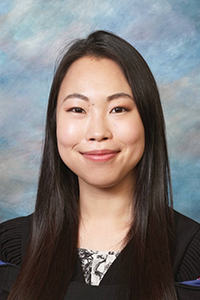 Chihori Tsukura (she/her) is originally from Yokohama, Japan and has been living in Canada (mostly on Vancouver Island) for almost 7 years since her undergrad. She completed her bachelors degree with honours in psychology at Vancouver Island University with several awards throughout the undergraduate program, acknowledging her academic excellence and involvement in the community. In November 2021, Chihori graduated with her Master of Occupational Therapy degree as a head of the class and was humbled to receive the Dr. Brock Fahrni Prize in Occupational Therapy. She is currently working as an occupational therapist in the community on Vancouver Island. In her spare time, Chihori likes going for walks on beach, watching movies, cooking/baking, and taking care of her plants.
Chihori Tsukura (she/her) is originally from Yokohama, Japan and has been living in Canada (mostly on Vancouver Island) for almost 7 years since her undergrad. She completed her bachelors degree with honours in psychology at Vancouver Island University with several awards throughout the undergraduate program, acknowledging her academic excellence and involvement in the community. In November 2021, Chihori graduated with her Master of Occupational Therapy degree as a head of the class and was humbled to receive the Dr. Brock Fahrni Prize in Occupational Therapy. She is currently working as an occupational therapist in the community on Vancouver Island. In her spare time, Chihori likes going for walks on beach, watching movies, cooking/baking, and taking care of her plants. Lauren Copping (she/her) is a recent graduate from the Master of Physical Therapy program at the University of British Columbia. She completed her Bachelors in Dance Science at Texas A&M University, where she performed in a contemporary dance company that travelled throughout the United States. Lauren then finished her Masters in Dance Science at Trinity Laban Conservatoire of Music and Dance in London, England.
Lauren Copping (she/her) is a recent graduate from the Master of Physical Therapy program at the University of British Columbia. She completed her Bachelors in Dance Science at Texas A&M University, where she performed in a contemporary dance company that travelled throughout the United States. Lauren then finished her Masters in Dance Science at Trinity Laban Conservatoire of Music and Dance in London, England.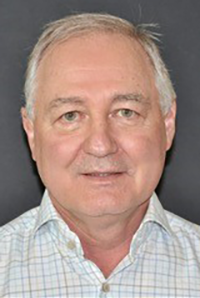 Dr. Mark Hill is a 2020 recipient of the UBC Medical Alumni Association
Dr. Mark Hill is a 2020 recipient of the UBC Medical Alumni Association 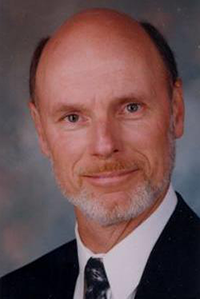 Dr. Greg Powell has a notable career of leadership and innovation that spans 40 years in the fields of emergency and aviation medicine, education, and research. He is a Professor Emeritus, Emergency and Family Medicine, University of Calgary, and is a founder of STARS (Shock Trauma Air Rescue Service) and the STARS Foundation (Shock Trauma Air Rescue Service Foundation. He held the position of Chief Executive Officer, STARS & STARS Foundation until March 2012 and continues today in the role of founder and director emeritus. Dr. Powell is an internationally recognized leader in critical patient care, air medical transportation and emergency medical training and education and has received many awards and significant recognition throughout his career. In 2006, he was appointed an Officer of the Order of Canada in recognition of his contribution to the community and Canada. In 2021, he was appointed to the Alberta Order of Excellence.
Dr. Greg Powell has a notable career of leadership and innovation that spans 40 years in the fields of emergency and aviation medicine, education, and research. He is a Professor Emeritus, Emergency and Family Medicine, University of Calgary, and is a founder of STARS (Shock Trauma Air Rescue Service) and the STARS Foundation (Shock Trauma Air Rescue Service Foundation. He held the position of Chief Executive Officer, STARS & STARS Foundation until March 2012 and continues today in the role of founder and director emeritus. Dr. Powell is an internationally recognized leader in critical patient care, air medical transportation and emergency medical training and education and has received many awards and significant recognition throughout his career. In 2006, he was appointed an Officer of the Order of Canada in recognition of his contribution to the community and Canada. In 2021, he was appointed to the Alberta Order of Excellence.